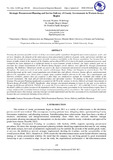| dc.description.abstract | Ensuring the provision of public services in Kenya necessitates public expenditure through the procurement of goods, works, and services; therefore, the integrity of the entire process from procurement to delivery of goods, works, and services and their use portrays the strength of proper management of public resources and fidelity to the Kenyan constitution. Yet, because there is misuse of public monies in the majority of the Counties and an alleged 50% of it is tied to the public procurement processes used, corruption has been identified as a significant barrier to socio-economic growth in Kenya. The study's primary goal was to ascertain how County Governments in the Western Kenya Region's service delivery were affected by strategic procurement planning. The Mc Kinsey 7sframework model was used as the study's framework and positivist research methodology was used throughout. The study was carried out in the counties of Kakamega, Busia, Vihiga, and Bungoma in western Kenya. The 228 officials that made up the study's target population were divided into chief officers, directors, finance officers, and procurement officers.174 respondents were chosen from a sample using stratified random selection in the study. Via a questionnaire and interview schedules, primary data was acquired. A pilot study was conducted to evaluate the reliability and validity of the research instruments. The study utilized both descriptive and inferential statistics. The findings of the study established that Strategic Procurement Planning significantly accounted for 40.5% of the variance in Service Delivery of County Governments in Western Kenya (R²=0.405, P<0.05). Specifically, when Strategic Procurement Planning increases by one unit, service delivery changes by 0.636 units (β1=0.636, P<0.05). As a result, the F test resulted in a value of (1, 161) =108.908, P<0.05, supporting the model's ability to explain variance in the dependent variable. Among county governments in the western Kenya region, there is a large and favorable correlation between strategic procurement planning and service delivery. The analysis suggests that county governments ensure that strategic sourcing strategies are fully implemented and that they are produced in a reasonable timeframe because they are essential for initiating service delivery. | en_US |

